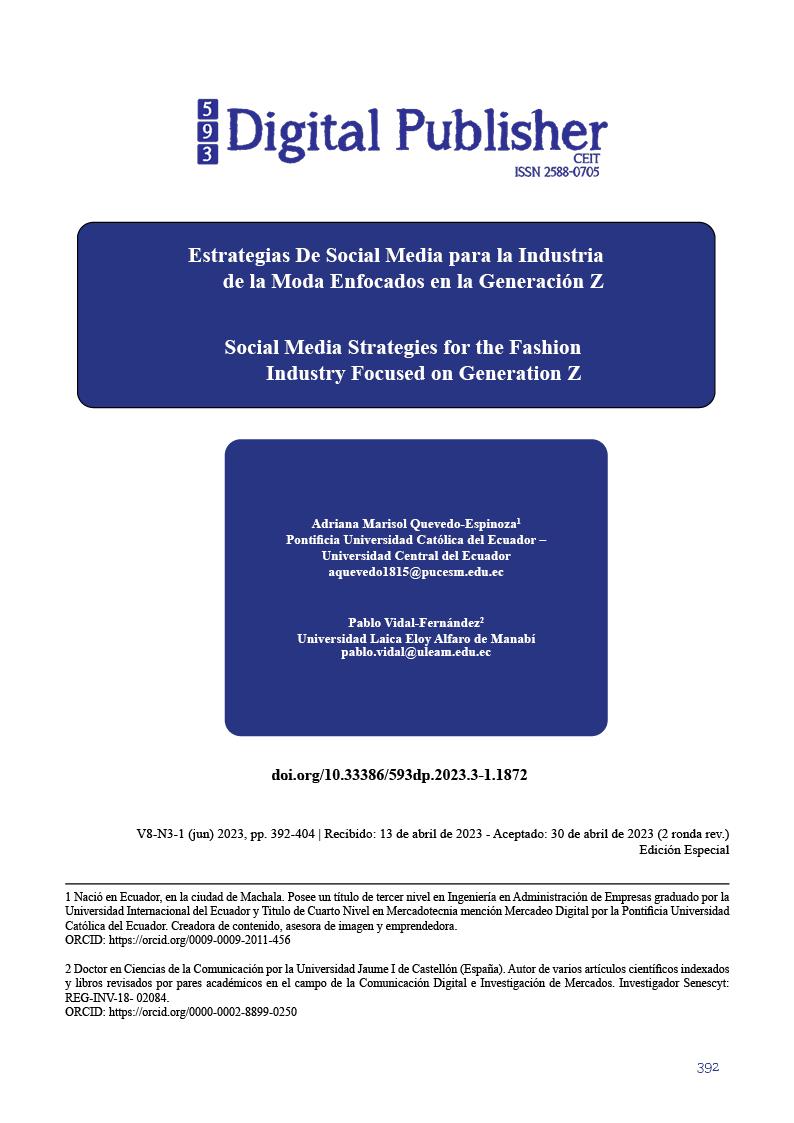Social Media Strategies for the Fashion Industry Focused on Generation Z
Main Article Content
Abstract
Generation Z, the first generation of digital natives that has grown up surrounded by technology and digital devices and information, so the fashion industry is one of the most affected by the changes in habits of this generation and its concern for sustainability and social responsibility. This research analyzes effective social media strategies for Gen Z in trends, diagnosing how brands use social media to position themselves. Given the quantitative nature of our research, we selected a fieldwork through online surveys for young people of generation Z in the city of Portoviejo, to determine their tastes and preferences in trends. A non-experimental descriptive approach will be used. This research focuses on the habits and preferences of young people of Generation Z in the city of Portoviejo in relation to fashion and social networks. It was evidenced that Instagram and TikTok are the most popular platforms, in addition to that, style and promotions are the most attractive aspects for respondents. Also, an important finding is that the majority of respondents do not follow fashion influencers on social media. Generation Z is fundamental for the trends industry due to its consumption potential and presence in the digital world. Trends brands must adapt their marketing and sales strategies to digital trends and social media platforms to attract this audience.
Downloads
Article Details

This work is licensed under a Creative Commons Attribution-NonCommercial-ShareAlike 4.0 International License.
1. Derechos de autor
Las obras que se publican en 593 Digital Publisher CEIT están sujetas a los siguientes términos:
1.1. 593 Digital Publisher CEIT, conserva los derechos patrimoniales (copyright) de las obras publicadas, favorece y permite la reutilización de las mismas bajo la licencia Licencia Creative Commons 4.0 de Reconocimiento-NoComercial-CompartirIgual 4.0, por lo cual se pueden copiar, usar, difundir, transmitir y exponer públicamente, siempre que:
1.1.a. Se cite la autoría y fuente original de su publicación (revista, editorial, URL).
1.1.b. No se usen para fines comerciales u onerosos.
1.1.c. Se mencione la existencia y especificaciones de esta licencia de uso.
References
Abadie, Y. & Ortiz, Y. (2019). La moda y la generación Z: Tendencias y patrones de consumo en México. Revista de Investigación Académica, 53, 1-18. Recuperado de https://www.redalyc.org/pdf/310/31059080001.pdf.
Afonso, B. (2021, 29 julio). Las tendencias de moda de la generación Z demuestran que son el grupo de edad más disruptivo de la historia. GQ España. Recuperado de https://www.revistagq.com/moda/articulo/tendencias-de-moda-generacion-z-pinterest.
Alban, G. P. G., Arguello, A. E. V., & Molina, N. E. C. (2020).
Álvarez Ramos, E., Heredia Ponce, H., & Romero Oliva, M. F. (2019). La Generación Z y las Redes Sociales. Una visión desde los adolescentes en España. Recuperado de https://rodin.uca.es/handle/10498/21358.
Barreiro, A. M. (2021). La sostenibilidad en los estudios de moda. Athenea Digital. Revista de pensamiento e investigación social, 21(1).
Barroso, C. L., Guardia, M. L. G., & Kolotouchkina, O. (2020). El impacto de las redes sociales en la estrategia de las marcas: Creatividad, engagement y eWOM. Las redes sociales como herramienta de comunicación persuasiva, 35. Recuperado de https://www.academia.edu/download/62125595/Libro-01-v11-HIGH-PRINT-DEF20200217-34468-ei379i.pdf#page=35.
Chiclla Flores, Maria Ines. (2023). La estrategia del marketing digital para la publicidad de una marca de ropa. Recuperado de http://190.119.244.198/handle/123456789/3213.
Critikián, D. M., Altaba, M. S., & Oceja, J. F. S. (2022). Hábitos de consumo de moda a través de influencers en la Generación Z. Vi.
Cristófol-Rodríguez, C., Mcquillan, K., & Segarra-Saavedra, J. (2021). La comunicación de la sostenibilidad como herramienta de ventas y de cambio social: fast fashion vs slow fashion. Revista de la SEECI, (54), 16.
De Angelis, M., Amatulli, C., & Pinato, G. (2020). Sustainability in the apparel industry: The role of consumers’ fashion consciousness. Sustainability in the Textile and Apparel Industries: Consumerism and Fashion Sustainability, 19-33.
Dohan, I. (2021). La generación Z: el nuevo reto del marketing digital. El caso de TikTok.
Duarte, W. D., Nacipucha, N. S., & Estrada, J. C. (2021). Marketing de contenidos y decisión de compra de los consumidores Generación Z en Ecuador. Eca Sinergia, 12(2), 25-37. Recuperado de: https://www.redalyc.org/journal/5885/588569075003/588569075003.pdf.
Francis, T., & Hoefel, F. (2018). True Gen’: Generation Z and its implications for companies. McKinsey & Company, 12.
Iniesta-alemán, I. (2019). Eficacia de los influencers como recurso publicitario en la estrategia de los anunciantes locales. Ámbitos. Revista Internacional de Comunicación, 46, 149-169.
Lima-Vargas, A. E., Cervantes-Aldana, F. J., & Lima-Vargas, S. (2022). La intención de compra en la generación Z en el mercado de moda. Contaduría y administración, 67(4), 72-97.
Luz Antúnez, K. E. D. L. (2020). ¿Quiénes son y cómo aprenden los jóvenes pertenecientes a la generación Z.
Martínez Casillas, R. E. (2022). Generación Z y redes sociales. Un consumo a estudio.
Martínez Urbina, N. D. (2019). Análisis del entorno de la industria de la moda en el ámbito textil en Ecuador (Bachelor's thesis, Quito, 2019.).
Niinimäki, K., Peters, G., Dahlbo, H., Perry, P., Rissanen, T., & Gwilt, A. (2020). The environmental price of fast fashion. Nature Reviews Earth & Environment, 1(4), 189-200.
Pérez Curiel, C., & Velasco Molpeceres, A. M. (2020). Nuevas narrativas del marketing de influencia en moda. Perfiles profesionales y modelos de consumo. Redmarka: revista académica de marketing aplicado, 24 (2), 1-9. Recuperado de: https://idus.us.es/handle/11441/115979.
Remitly Inc. (s. f.). What Is the Number One Dream Job Worldwide? Remitly. Recuperado de: https://www.remitly.com/gb/en/landing/dream-jobs-around-the-world.
Vitoria Fernández, D. (2019). La generación Z: el objetivo principal del nuevo marketing en redes sociales mediante influencers de moda. Un caso concreto: Laura Escanes (Doctoral dissertation, Universitat Politècnica de València).



